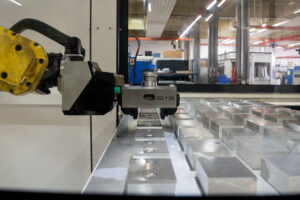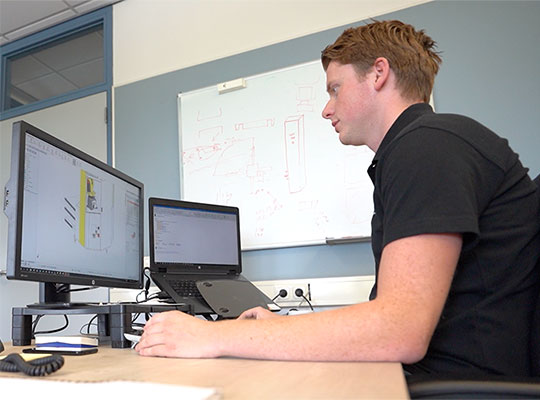Automation provides peace of mind
There are a number of variables to be dealt with in production in machining companies. Think, for example, of the availability and deployability of people, machines and materials. All of these variables influence the production planning. In addition, rush orders, which have to be completed in between, are a major disturbance within the pre-planned production. The time involved can be made up by means of unmanned production in the evenings, nights and weekends. In automated production, “emergencies” cause little or no stagnation in production planning. This creates peace and comfort in your production department and you can always satisfy your customers with on-time delivery of quality products.
Twofold benefit in production planning
 To summarise, automation in the area of planning offers a two-fold advantage. Firstly, with an automated process, the exact lead time is known in advance. This is in contrast to a situation where a person operates the machine. A related advantage is that the work preparation can be planned much more concretely, because uncertain (human) factors are removed. With a robot, it is the sum of the number of parts and the cycle time per part that ensures that the total throughput time is fixed.
To summarise, automation in the area of planning offers a two-fold advantage. Firstly, with an automated process, the exact lead time is known in advance. This is in contrast to a situation where a person operates the machine. A related advantage is that the work preparation can be planned much more concretely, because uncertain (human) factors are removed. With a robot, it is the sum of the number of parts and the cycle time per part that ensures that the total throughput time is fixed.
The next step for further optimisation and integration of the production planning results from the digitalised working environment. Here, hardware and software are linked and integrated with, for example, tool management systems and the linking of NC file programs. In such a digitalised production environment, an operator has real-time insight into the production process. This enables him or her to prepare the production properly, look ahead, critically monitor the product series and, where necessary, immediately intervene or make adjustments.
Robot complements employees
Fortunately, we notice in daily practice that most people on the work floor no longer see robots as a threat, but more as valuable colleagues. Add to this the fact that a growing number of entrepreneurs recognise the non-economic benefits that automation brings and you have all the ingredients to profit optimally and sustainably from it. To put it simply, robots take away a lot of heavy and repetitive work from employees, giving them more time to further develop their core qualities. Robots that are complementary to your employees will therefore, in practice, yield much more profit for your company than you may have calculated beforehand.

Automation offers new opportunities
By leaving time-consuming repetitive work to robots, a different company culture automatically arises, as it were. During the day, people are no longer primarily occupied with production tasks. With smart automation, a large part of the unmanned production is moved to the evenings, nights and weekends. As a result, the working days can be used much more for innovations, product optimisation and improving internal processes, for example. This gives employees much more substance in their day-to-day work. The specific professional knowledge, expertise and practical experience of the staff are utilised on a much broader front. People are challenged intellectually and technically and, as a result, immediately feel much more involved in the ins and outs of your company. It gives the job of operators and production managers another dimension and lifts the quality of the total product to an even higher level.
Positive effects contribute to strong image
Customers who have taken the step to automated production have noticed the positive effect this has on job satisfaction. It binds well-trained and motivated employees and it makes your company more interesting for new employees. Who wouldn’t like to work in a progressive company, where you get every opportunity to use and expand your talents? Apart from this, the clever use of the automation possibilities also does something to the image of your company. Enthusiastic employees become ambassadors of your company and the positive mindset also radiates to existing and potential new customers. A solid production company that makes optimum use of automation and all its irreplaceable human qualities is a party that others are happy to work with. This is something we experience all too often at Cellro when we invite potential customers to visit one of our references.
Automation increases competitiveness
 As you can read, the use of automation has various positive (side) effects. One effect that has not yet been mentioned is increasing the competitiveness of your company. More innovative power increases the quality of existing products, new products are created and there is room to increase production capacity. This in turn ensures that you can serve your existing customers even better and creates more room for new customers. Smart automation makes you more responsive as a producer and ensures that you are not only competitive in terms of price and quality, but also have a head start in the market in terms of quality, capacity and speed.
As you can read, the use of automation has various positive (side) effects. One effect that has not yet been mentioned is increasing the competitiveness of your company. More innovative power increases the quality of existing products, new products are created and there is room to increase production capacity. This in turn ensures that you can serve your existing customers even better and creates more room for new customers. Smart automation makes you more responsive as a producer and ensures that you are not only competitive in terms of price and quality, but also have a head start in the market in terms of quality, capacity and speed.
Discover how automation can also change your business
Do you want to automate your production and do you have doubts about what this will mean for your company, both directly and indirectly? Then get in touch with us. In the Cellro showroom or during a visit to one of our many wonderful customers, we will surely be able to convince you that investing in automation will yield much more than you may have always thought.

